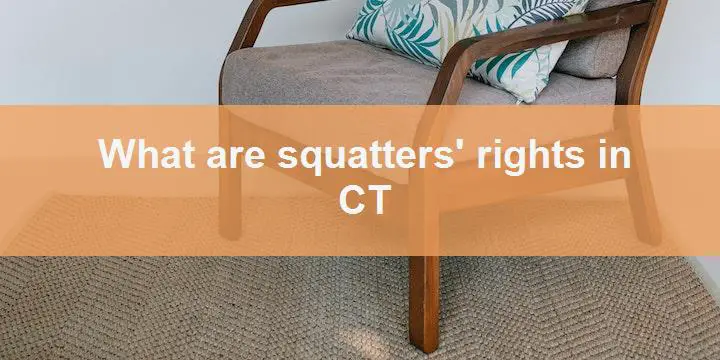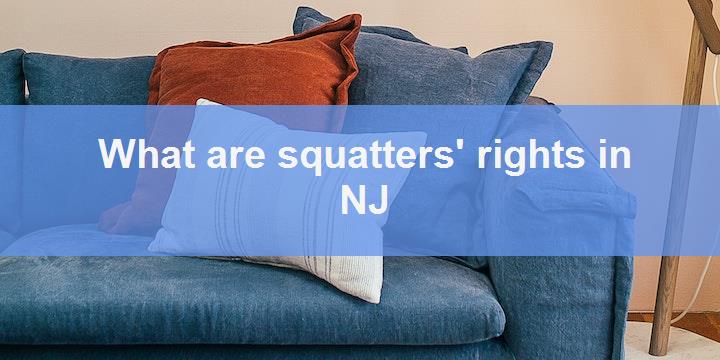What are squatters’ rights in Connecticut?
Firstly, it’s important to understand the definition of a squatter. Essentially, a squatter is a person who occupies a property without the legal right to do so. Now, when it comes to squatters’ rights in Connecticut, there are a few things to keep in mind. For example, to claim adverse possession (which is essentially a legal way for squatters to gain ownership of a property), the individual must occupy the property openly and continuously for a minimum of 15 years. Additionally, the individual must also pay taxes on the property and make improvements to it during that time. Ultimately, it’s important for squatters in Connecticut to understand the legal process and requirements in order to protect their rights.
What is the squatting/squatter?
Squatting, also known as occupying, is a contentious issue. On one hand, it can be seen as a viable solution for housing needs, while on the other hand, it can be viewed as an illegal and unjust practice. Squatters are people who occupy empty or abandoned buildings without the permission of the property owner or government. They typically use the space as their homes. For example, in London, the squatting scene is relatively large and diverse, with a variety of people going by different names and squats popping up all over the city. Squatting can sometimes lead to conflict, especially if the owner of the building wants to evict the squatters. Despite this, the demand for affordable housing in cities around the world continues to rise.
What is Adverse posession in Connecticut?
Adverse possession is a legal concept that allows a person to gain ownership rights to a property through continuous use for a certain period of time. In Connecticut, the requirements for adverse possession are quite stringent. Firstly, the possession must be actual, open, and notorious – meaning that the property must be occupied in a manner that it is clear to others that the person is using it. Secondly, the possession must be continuous for at least 15 years. Additionally, the person must also have acted in a manner consistent with the ownership of the property during this time. Therefore, it is important for property owners in Connecticut to be aware of the legal requirements for adverse possession to avoid any potential issues.
Is it legal to squat in Connecticut?
Firstly, it is important to note that Connecticut state law has no clear definition or statute for squatting. However, that does not mean squatting is automatically legal. In fact, squatting on someone else’s property without permission is considered trespassing, which is illegal. Additionally, squatting can also lead to potential safety hazards and unsanitary living conditions. Therefore, while it may not be explicitly illegal to squat in Connecticut, it is still not a recommended or lawful practice.
Can police remove squatters in Connecticut?
Yes, police have the authority to remove squatters from properties in Connecticut. Firstly, it is important to note that squatters have no legal rights to the property they occupy, regardless of how long they have been living there. Therefore, if the owner of the property wishes to have them removed, they can contact the police for assistance. Furthermore, if the squatters refuse to leave, the police have the power to forcibly remove them, using reasonable force if necessary. Overall, it is important for property owners to be aware of their rights and know that they have legal options available to deal with squatters.
How to evict squatter in Connecticut?
Evicting squatters in Connecticut can be a tricky process, but there are steps you can take to protect your property. Firstly, it’s important to understand the laws regarding squatters and their rights.
If the squatters have been in your property for a long time, you may need to go through a court proceeding to legally evict them. You’ll want to document any evidence of illegal entry, disruption of your property, and any attempts at communication you’ve had with the squatters. It’s also important to give the squatters a reasonable amount of notice before evicting them. Finally, hiring a lawyer who specializes in eviction cases can be a helpful step in ensuring a successful eviction process.
FAQ
Q: What are squatters’ rights in Connecticut?
A: Squatters’ rights, also known as adverse possession, refers to the legal concept that allows a person to claim ownership of a property if they have used and occupied it continuously without the owner’s permission for a certain period of time.
Q: How long do you have to occupy a property in Connecticut to claim squatters’ rights?
A: In Connecticut, a squatter must occupy the property continuously for 15 years before they can claim ownership.
Q: Can someone claim squatters’ rights on any property?
A: No, for a squatter to claim ownership, the property must meet certain requirements. It must be abandoned, neglected, or unused, and the squatter must have openly occupied and used it without the owner’s permission for the specific designated time period.
Q: What are the legal implications of squatters’ rights in Connecticut?
A: Squatters’ rights can be hard to dispute if they are legally upheld in court. The owner may lose the property if the squatter’s claim is successful.
Q: Can a property owner remove a squatter without going to court?
A: No, property owners cannot forcibly remove a squatter; they must go through the legal process and obtain a court order for eviction.
Q: What should a property owner do if they suspect someone is squatting on their property?
A: Property owners should contact a lawyer immediately and start the process to evict the squatter. Ignoring the situation could result in the squatter being granted ownership of the property.
Q: Are there any exceptions to the 15-year requirement for squatters’ rights in Connecticut?
A: In certain situations, the time requirement may be shortened. For example, if the squatter can prove they have paid property taxes for the previous 7 years, the time requirement may be reduced to only 7 years of continuous occupancy. However, this is determined on a case-by-case basis, and legal counsel should be consulted.
Also Reading
Michigan average utility bill
Top pros and cons of living in Worcester
Reading pros and cons of living




